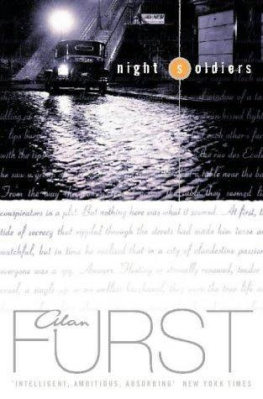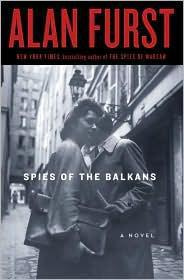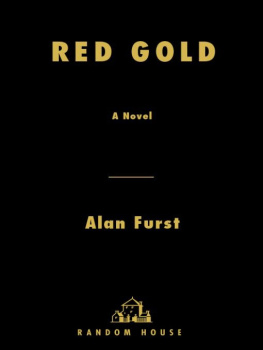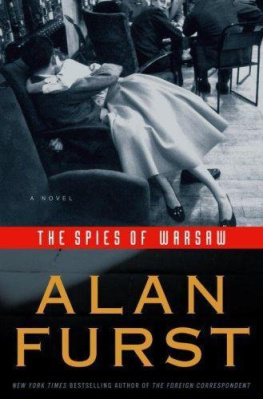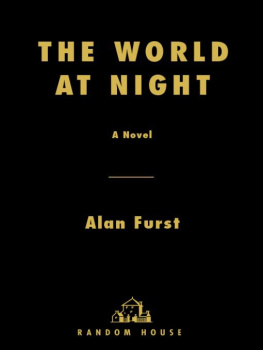Alan Furst - Dark Voyage
Here you can read online Alan Furst - Dark Voyage full text of the book (entire story) in english for free. Download pdf and epub, get meaning, cover and reviews about this ebook. genre: Detective and thriller. Description of the work, (preface) as well as reviews are available. Best literature library LitArk.com created for fans of good reading and offers a wide selection of genres:
Romance novel
Science fiction
Adventure
Detective
Science
History
Home and family
Prose
Art
Politics
Computer
Non-fiction
Religion
Business
Children
Humor
Choose a favorite category and find really read worthwhile books. Enjoy immersion in the world of imagination, feel the emotions of the characters or learn something new for yourself, make an fascinating discovery.

- Book:Dark Voyage
- Author:
- Genre:
- Rating:4 / 5
- Favourites:Add to favourites
- Your mark:
- 80
- 1
- 2
- 3
- 4
- 5
Dark Voyage: summary, description and annotation
We offer to read an annotation, description, summary or preface (depends on what the author of the book "Dark Voyage" wrote himself). If you haven't found the necessary information about the book — write in the comments, we will try to find it.
Dark Voyage — read online for free the complete book (whole text) full work
Below is the text of the book, divided by pages. System saving the place of the last page read, allows you to conveniently read the book "Dark Voyage" online for free, without having to search again every time where you left off. Put a bookmark, and you can go to the page where you finished reading at any time.
Font size:
Interval:
Bookmark:
Alan Furst
Dark Voyage
UNDER SPANISH FLAG
In the port of Tangier, on the last day of April, 1941, the fall of the Mediterranean evening was, as always, subtle and slow. Broken cloud, the color of dark fire in the last of the sunset, drifted over the hills above the port, and streetlamps lit the quay that lined the waterfront. A white city, and steep; alleys, souks, and cafs, their patrons gathering for love and business as the light faded away. Out in the harbor, a Spanish destroyer, the Almirante Cruz, stood at anchor among the merchant steamers, hulls streaked with rust, angular deck cranes hard silhouettes in the dusk.
On board the tramp freighter Noordendam, of the Netherlands Hyperion Line, the radio room was like an oven and the Egyptian radio officer, known as Mr. Ali, wore only a sleeveless undershirt and baggy silk underdrawers. He sat tilted back in his swivel chair, smoking a cigarette in an ivory holder and reading a slim, filthy novel in beautifully marbled covers. From time to time, he would remove his gold spectacles and wipe his face with a cloth, but he hardly noticed. He was used to the heat, the effect of a full days sun on the ships steel plate, and, come to that, used to these ports, hellholes always, Aden or Batavia, Shanghai or Tangier, and he was much absorbed in the noisy pleasures of the people in his novel. On the wireless telegraph before him, a gray wall of switches and dials, the ether crackled with static, his duty watch had less than an hour to run, and he was at peace with the world.
Then, from the static, a signal. On the BAMS frequency-Broadcasting for Allied Merchant Ships-and, he thought, far out at sea. He set the book face down on the work shelf below the radio, put on the headphones, and, with delicate thumb and forefinger, adjusted the dial for the strongest reception.
Q, Q, Q, Q.
For this message he didnt need the BAMS codebook-not since May of 1940 he didnt. It meant I am being attacked by an enemy ship and hed heard it all too often. Here it came again, the operator fast and heavy on the key. And again, and again. Poor man, he thought. His fellow radio operator on some battered old merchantman, tapping out his final message, his ship confronted by a surfaced submarine or an E-boat raider, the shot already across her bows or her engine room torn apart by a torpedo.
What Mr. Ali could do, he did. Opened the radio logbook, noted the date and the time, and recorded the anonymous cry for help. DeHaan, captain of the Noordendam, would see it when he put the ship to bed for the night-he never failed to check the logbook before going to his cabin. If they had been at sea, Mr. Ali would have notified the captain immediately but now, in port, there was no point. Nothing they could do, nothing anyone could do. It was a big ocean, British sea power concentrated on the convoy routes, there was nobody to challenge the enemy or pick up survivors. The ship would die alone.
The signal went on for a time, fifty seconds by the clock on the radio array, and likely went on longer still, perhaps sending the name of the ship and its coordinates, but the transmission disappeared, lost in the rising and falling howl of a jammed frequency. Bastards. Mr. Ali watched the clock; five minutes, six, until the jamming stopped, replaced by empty air. He was taking the headphones off when the signal returned. Once only, and weaker now, the ships electrical system was almost gone. Q, Q, Q, Q, then silence.
DeHaan, at that moment, was ashore-had just left the gangway of the harbor launch and approached a battle-scarred Citron parked on the pier, TAXI TARZAN painted on its door, its Moorish driver stretched out in the back, hands clasped beneath his head, for his evening nap. DeHaan looked at his watch and decided to walk. The rue Raisuli was supposedly just beyond the Bab el Marsa, Gate of the Port, which he could see in the distance. He had been invited- ordered, he thought, that was the honest word-to a dinner given by a man called Hoek. Other than the fact that such things never happened, a perfectly normal request, so, one better go. Put on the shore uniform-double-breasted navy blazer over a soft gray shirt and dark wool trousers, and the tie, blue with a silver spaniel-and go.
He walked purposefully along the quay, thanking his stars as he passed a Norwegian tanker berthed at the pier and caught the rich aroma of aviation fuel. Of all the ways he didnt want to die. DeHaan was tall, seemed tall, and lean, with strength in the arms and shoulders. Regular features: a North Sea face, gray eyes, sometimes cold, sometimes warm, with seafarers lines webbed at the corners, and rough, fair hair, almost brown, its first gray-hed just turned forty-one-visible in sunlight. A certain lift to this face; pride, maybe, of profession not position-good as any man, better than none. Thin lips, not far from a smile, that Dutch set of the mouth which found the world a far more eccentric, and finally amusing, place than its German versions to the east. He had big hands, appreciated by women, whod told him about it. Surprise to DeHaan, that idea, but not unwelcome.
Should he have worn his uniform? The Hyperion Line had one, plain and blue, for their captains, traditional on the first day of a voyage and never seen again, but DeHaan disliked the thing. It wasnt, to him, a real uniform, and a real uniform was what hed wanted. In May of 1940, when the conquering Germans had stripped out the filing cabinets of the Royal Dutch Navy administration building in The Hague, theyd surely found, and just as surely refiled for their own purposes, the 1938 application of one DeHaan, Eric Mathias, virtually begging for a commission, and service on a destroyer, or a torpedo boat, or anything, really, that shot.
He walked past the railway station and, a few minutes later, entered the narrow streets behind the Bab el Marsa gate-another world. Fragrant, the Maghreb. Stronger than he remembered; twenty-five years at sea, he thought, and too many ports. Fresh orange peel on the cobbled street, burning charcoal and-grilled kidney? He rather thought it was, nothing else quite smelled like that. Ancient drains, cumin, incense. And hashish, nothing else quite smelled like that. A scent encountered now and again aboard the Noordendam, but one mostly ignored it, as long as the men werent on watch. He was himself, as it happened, not entirely innocent of such things, the stuff had been one of what Arlette called her vile little pleasures. One of many. Theyd used it one night in her room in the rue Lamartine, balancing tiny morsels on a burning cigarette end in an ashtray and sucking up the smoke through a tightly rolled hundred-drachma note hed found in his pocket. Then theyd made ferocious and wildly chaotic- Ah, this! No, this! But what about this? love, after which hed fallen dead asleep for ten hours then woke to make Arlette a colossal Dutch pancake swimming in butter.
In the rue Raisuli, Arab music from a dozen radios, and two Spanish Guardia, in their Napoleonic leather hats, strolling along in a way that told the world they owned the street. Which, officially, they did. Tangier had been since 1906 an International Zone, a free port trading in currency, boys, and espionage. Now Spain had taken control of the city, incorporated into Spanish Morocco, which meant that Casablanca was French, ruled from Vichy, and Tangier Spanish, and neutral, and governed by Madrid. But DeHaan and everybody else knew better. It was, like Paris, one of those cities emphatically owned by the people who lived in it. And how, DeHaan wondered, did Mijnheer Hoek fit into all this? Trader? Emigr? Decadent? All three? Number 18 in the rue Raisuli turned out to be a restaurant, Al Mounia, but not the sort of restaurant where important people gave private dinners.
DeHaan parted the bead curtain, stepped inside, and stood there for a moment, looking lost. This cant be right, he thought. Tile floor, bare wooden tables, a few customers, more than one reading a newspaper with dinner. Then a man he took to be the proprietor came gliding up to him, DeHaan said, Monsieur Hoek? and that turned out to be the magic phrase. The man clapped his hands twice and a waiter took DeHaan through the restaurant and out the back, into a courtyard bounded by tenements where life went on at full pitch; six stories of white laundry hung on lines strung across the sky, six stories of families eating dinner by open windows. From there, DeHaan was led through a damp tunnel into a second courtyard, an unlit, silent courtyard, then down an alley to a heavy, elaborately carved door. The waiter knocked and went on his way as a voice from within called out, Entrez.
Font size:
Interval:
Bookmark:
Similar books «Dark Voyage»
Look at similar books to Dark Voyage. We have selected literature similar in name and meaning in the hope of providing readers with more options to find new, interesting, not yet read works.
Discussion, reviews of the book Dark Voyage and just readers' own opinions. Leave your comments, write what you think about the work, its meaning or the main characters. Specify what exactly you liked and what you didn't like, and why you think so.

